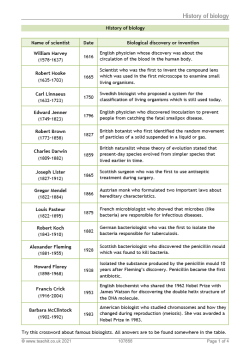History of biology

A timeline summary of the key scientists in the history of biology, along with facts about their biological discovery or invention. Includes reference to the work of Harvey, Hooke, Linneaus, Jenner, Brown, Darwin, Lister, Pasteur, Kock, Fleming, Watson, Florey and Nobel Prize winner Barbara McClintock.
This KS3-4 resource also includes a quick formative assessment or learning check in the form of a crossword (with answers for self- or peer-assessment) to assess students' understanding. This encourages closer engagement with the information as students skim and scan to answer the relevant clues.
Download the accompanying resources, History of physics and History of chemistry if you are teaching combined science.
Example biologists from the timeline:
|
Alexander Fleming (1881–1955) |
1928 |
Scottish bacteriologist who discovered the penicillin mould which was found to kill bacteria. |
|
Howard Florey (1898–1968) |
1938 |
Isolated the substance produced by the penicillin mould 10 years after Fleming’s discovery. Penicillin became the first antibiotic. |
|
Francis Crick (1916–2004) |
1953 |
English biochemist who shared the 1962 Nobel Prize with James Watson for discovering the double helix structure of the DNA molecule. |
|
Barbara McClintock (1902-1992) |
1983 |
American biologist who studied chromosomes and how they changed during reproduction (meiosis). She was awarded a Nobel Prize in 1983. |
